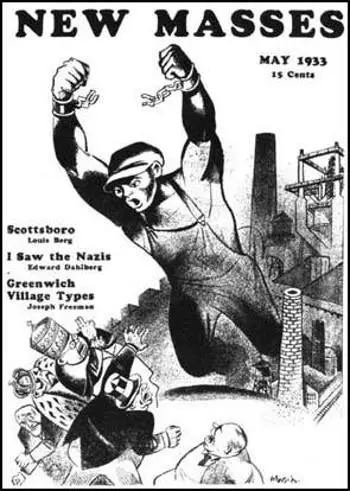New Masses
In 1922 the left-wing journal, The Liberator, was taken over by Robert Minor and the American Communist Party. Many of the people who contributed to the journal such as Michael Gold and John Sloan were unhappy with this development and in May 1926, they started their own journal, the New Masses. Rex Stout, contributed $4,000 to help the magazine get started.
Over the years most of the well-known left-wing writers and artists produced material for the magazine. This included Max Eastman, Upton Sinclair, Sherwood Anderson, Erskine Caldwell, Richard Wright, Ernest Hemingway, Alvah Bessie, James Agee, Ralph Ellison, Joseph North, Langston Hughes, John Dos Passos, Josephine Herbst, Albert Maltz, Agnes Smedley, John L. Spivak, Meridel Le Sueur, Theodore Dreiser, Floyd Dell, Art Young, William Gropper, Albert Hirschfeld, Carl Sandburg, Waldo Frank, Granville Hicks and Eugene O'Neill.

Michael Gold became editor but when he allowed the New Masses to become a strong supporter of the Soviet Union, non-communists such as Max Eastman, Rex Stout and Floyd Dell ceased to become involved in the journal. Gold produced a visually exciting journal by employing artists such as William Gropper, Art Young, Hugo Gellert and Reginald Marsh. By 1935 sales had reached 25,000.
According to David Peck: "The New Masses sponsored some of the decade's most important literary organizations (the John Reed Clubs in the early thirties, the first American Writers and Artists Congresses in 1935), provoked some of its most controversial literary discussions (on proletarian literature and Marxist literary criticism), and published some of the best radical literature to come out of the thirties (the reportage of Meridel Le Suer, John L. Spivak, Josephine Herbst, and Agnes Smedley)."
After the outbreak of the Spanish Civil War the New Masses was a strong supporter of the Popular Front government and tended to concentrate on the growing fascist threat and in order to achieve left-wing unity was far less critical of liberals and other non-communists.
Joseph North was sent to report on events in Spain. Ernest Hemingway was highly critical of Joseph North's reporting of the Spanish Civil War. He did not like the way that his articles did not provide an objective account of the conflict. "I like the Communists when they're soldiers; when they're priests, I hate them. Yes, priests, the commissars who hand down the papal bulls... That air of authority your leaders wear, like cassocks." Hemingway used to call North "Stalin" and on one occasion he told him: "Listen, Comrade Stalin, we've (the journalists working for the North American Newspaper Alliance) filed more good stuff in one day than the Worker has printed in two years."
Vincent Sheean, who was working for the New York Herald Tribune, toured the front-line with North and was astonished that his fellow reporter took little interest in military operations or in verifying information until he realized that no matter what happened, North reported the conflict on the orders of the Communist Party of the United States (CPUSA). Milton Wolff agreed with Sheean's assessment and that he "unfailingly underestimated casualties" and seemed to "believe everything he wrote in the Daily Worker".
The New Masses ceased publication in March 1948.
